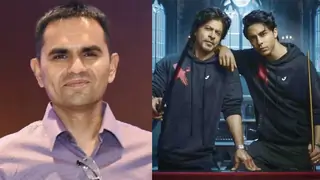About Kishore Da
Kishore Kumar (August 4, 1929 - October 13, 1987), born as Abhas Kumar Ganguly, was a Bollywood film playback singer (Hindi, Bangla, Marathi, Assamese, Gujarati, Kannada, Bhojpuri, Oriya) and actor of BengaliIndian origin. Kishore is widely acknowedged as a true genius and is regarded as one of the finest ever Indian male playback singers of all times - along with Mohammed Rafi and Mukesh.
Although known primarily for his successes as a singer, Kumar also was a noted actor. His comedy work included Chalti Ka Naam Gaadi (1958), Half Ticket (1962), Padosan (1968), Baap Re Baap (1955), Pyar Diwana (1973), Hungama (1971), and Badthi Ka Naam Dadhi (1974). As a straight actor he had roles in films such as Naukri, Bandi, Door Gagan Ki Chhaon Mein, and Door Ka Raahi.
In addition, Kumar achieved notable successes as a lyricist, composer, producer, director, screenwriter and scriptwriter.
Childhood
Kumar was born in a Bengali family as Abhas Kumar Ganguly, in the small town of Khandwa in Madhya Pradesh. His father Kunjalal Ganguly was a lawyer from a middle-class family, whereas his mother Gouri Devi was from a wealthy background. Kumar was the youngest of four children born to his parents. Ashok Kumar was the eldest son, followed by Sati Devi, the only daughter in the family. Next was Anoop Kumar, and five years younger than Anoop was Kishore.
When Kumar was still a child, his elder brother Ashok Kumar became a star actor in Bollywood, which had a major effect on the youngest Kumar. He became a great fan of K. L. Saigal and used to do impressions of his singing. Often his parents would persuade him to mimic his brother's Ashok Kumar's song Main ban ka panchhi ban ban ke. Anoop Kumar also ventured into Bollywood following Ashok's successes.
[edit]
Initial days in Bollywood
Kishore Kumar followed his elder brothers' footsteps and came to Mumbai to pursue a career in films as a singer. At this juncture, Anoop's career was stalling as his singing was not as strong as his acting (this was an era where actors who could also sing were in great demand.) On a visit to Austria Anoop bought some records to help him improve his vocal skills. On a later occasion, back in India, he was reportedly entering his home when he heard yodelling emerging from a room. Annoyed, he is said to have thundered "Who touched my records?" However, on entering the room he found that it was in fact the youngest Kumar whose voice it was. He had learned how to yodel from Anoop's Austrian records.
Kumar disliked acting and instead wanted to become a leading singer in Bollywood. However, he didn't have any formal training in singing or music. Through his brother Ashok's contacts in the industry Kumar did though make his debut in films - initially failing to make an impression. But he continued acting, which allowed him to sing on the soundtracks of the films. At this stage of his career, Kumar's style was derivative of K. L. Saigal's. Once, Sachin Dev Burman came to Ashok Kumar's house and heard what sounded like K. L. Saigal's voice coming out of the bathroom. Impressed, S. D. Burman asked Ashok who was singing. Hearing the answer, he waited until Kishore Kumar had finished bathing. He had a little talk with Kumar during which he expressed his appreciation of his singing but advised, "Don't try to ape K. L. Saigal. Apers never make great artists. You should develop your own singing style." After this, Kumar developed his own trademark singing style, which was completely different from the styles of Rafi, Mukesh and Saigal. He used to yodel in many of his songs. Sachin Dev Burman became his mentor and guide. S D Burman, who had never heard yodelling before, used to call it "gala tod ke gaana" ('break-throat singing'). Yodelling became Kishore's trademark, and the media described his singing style as "yodelling at the moon".
[edit]
Kishore becomes a known face
Kishore never wanted to act, but he was too afraid to rebel against his elder brother Ashok Kumar, who was bent on making him a popular Bollywood hero. After his initial films flopped, Kishore decided that he would act so badly in the forthcoming movie that no producer would ever again ask him to act in a movie. As a result of this decision, Kishore started acting in a strange, funny way. But instead of rejecting him, moviegoers were delighted to see a hero who could make them laugh. His style was a welcome change from the sober, romantic and tragic traditional heroes of Bollywood. Thus, Kishore became immenseley populer in comedy films. In the late 1950s, he was known for running from one studio to another, recording songs, acting, composing music and sometimes even writing lyrics. In the mean time, produced and directed several movies.
Apart from S. D. Burman, Khemchand Prakash was another composer who recognized Kishore's singing talent early. He composed Kishore's songs in the movie Ziddi. Ziddi's songs established Kishore as a singer. Incidentally, it was at Khemchand's studio, where Kishore met Lata Mangeshkar, with whom he sang many duets later. Lata was going to Khemchand's studio and Kishore was also bound for the same place. Lata was under the impression that she was being followed. It was only after reaching the studio that she realized that it was Kishore, Ashok Kumar's younger brother. Soon, many other composers like Ravi realized that Kishore had potential to be a good singer. Many lyricists, including Majrooh Sultanpuri and Shailendra became ardent admirers of Kishore.
S. D. Burman established Kishore as the voice of popular actor Dev Anand when he got him to sing for Dev Anand in the movies Taxi Driver and Paying Guest. After S D Burman fell out with Lata Mangeshkar in 1957, he gave patronage to Asha Bhosle. Till this time, duets were not very popular in Bollywood. Once S. D. Burman told Majrooh Sultanpuri "We invest so much energy in recording duets, and nobody likes them". Majrooh replied "The mistake is ours. We lyricists never write any good songs that couples would love to hum." S. D. Burman and Majrooh went on to work together on the most popular duets in the late 1950s. S. D. Burman, Majrooh, Asha and Kishore worked together in many movies including Kishore's home production Chalti Ka Naam Gaadi (1958), in which Kishore Kumar, Madhubala, Ashok Kumar and Anoop Kumar acted. The songs Ek ladki bheegi bhaagi si, Haal kaisa hai janaab ka, and Paanch rupaiya baara aana became very popular. They were also heard in Dev Anand's Paying Guest (1957) and Teen Deviyan. The song Mana janab ne pukara nahin from Paying Guest was incredibly popular among viewers. Asha and Kishore became famous for singing 'casual' duets like Chhod do aanchal, zamaana kya kahega, Aye nigah-e-mastana, Aankhon mein kya ji, Arre yaar meri, tum bhi ho gajab, and Chhedo na meri zulfein. Majrooh, Asha and Kishore also recorded popular duets with composer Ravi in the movie Dilli Ka Thug (1958) - C...A...T...Cat maane billi, and Hum to mohabbat karega.
Majrooh Sultanpuri and Shailendra were favorite lyricists of Kishore. He got them to write songs in his home productions. In those days, musicians would recommend lyricists to producers. The musician duo Shankar-Jaikishan had promised Shailendra that they would recommend him to all the producers, but they didn't keep their promise. Shailendra sent them a note - Chhoti si yeh duniya, pehchaane raaste hain; Kahin to miloge, phir poochhenge haal (The world is small, the roads are known; we shall meet somewhere, then I would ask you - "How do you do"). Shankar-Jaikishan realized their mistake. They made a song out of the above words and got Kishore to sing it.
Majrooh penned most of Kishore's hit songs in his initial days, most of them with S D Burman, for Dev Anand - Hum hain raahi pyaar ke, Maana janaab ne pukaara nahin etc.
Kishore was interested in composing music as well. It is said, along with Kalyanji Shah (of Kalyanji-Anandji fame), he introduced electronic music to Bollywood. The electronic sounds in some of S D Burman's music are credited to Kishore (he assisted S D Burman sometimes). Sometimes, Kishore would compose music himself and write lyrics too. In 1961 movie, Jhumroo, Kishore wrote, composed and sang Main hoon jhumroo. This song is a very nice example of his yodelling ability. Kishore could sing in female voice too. In Half Ticket (1962), he sang "Aake Seedhi Lagi" in male as well as female voice. The song was written by Shailendra and composed by Salil Chowdhury.
[edit]
The lean patch in Kishore's career
During the 1960's, there was a lean patch in Kishore's career. Most of his films as an actor flopped. Very few of his songs from this phase are memorable - Zaroorat hai, Zaroorat hai (Manmauji - 1962), penned by Rajinder Krishan and composed by Madan Mohan) stands out from this period. Mohammed Rafi and Mukesh were the favorites of most music composers, so Kishore never got to sing very good songs. A few of his songs picturized on Dev Anand and composed by S D Burman, got him recognition - Gaata rahe mera dil (Guide 1965, a duet with Lata), Yeh dil na hota bechara (Jewel Thief 1967), etc.
In 1966, S D Burman's son Rahul Dev Burman burst into the music scene with superhit score of the movie Teesri Manzil. He had got Rafi to sing all the songs in the movie. But, later R D Burman (also known by his pet name "Pancham") gave great patronage to Kishore Kumar. Their first hit movie together was the laught-riot 'Padosan' (The Neighbour). In this movie, Kishore Kumar played the role of Sunil Dutt's guru. Sunil Dutt's role was of boy who was in love with his next-door neighbour, a girl obessed with singing. To impress the girl, he gets his guru to do 'playback' for him. Kishore Kumar did the 'playback' in the movie, both on-screen and off-screen. Kishore and Pancham created the superhit song Mere saamnewali khidki mein. In one scene, there was a verbal fight between Mehmood (who acted as the girl's guru) and Sunil Dutt/Kishore Kumar. Kishore insisted that it would be boring if the dialogues were spoken in a plain manner. Mehmood fully agreed with him. So, Kishore, Mehmood, lyricist Rajinder Krishan and Pancham sat together and came up with the 'musical fight' - Ek chaturnar, karke singaar. The song, sung by Kishore and Manna Dey (who sang for Mehmood) became very popular. Manna Dey who is a trained classical singer found it preposterous that he should lose the song fight to an untrained voice like Kishore Kumar and he refused to be a part of the song. Mehmood (also the films producer) had to personally assure Manna Dey that he was a better singer and it was the films script that dictated that he loses the song.
[edit]
The superstar era
In 1969, Shakti Samanta produced the movie Aradhana with newcomer Rajesh Khanna. The composer was Sachin Dev Burman and he had divided songs equally among his favorite singers - Kishore, Mohammed Rafi and Lata Mangeshkar. Kishore sang the romantic duet Kora kagaz tha yeh man mera with Lata. S D Burman fell ill before he could record all the songs. He had already created the tunes for the songs Roop tera mastana and Mere sapnon ki rani. R D Burman took the responsibility of completing the recording. In doing so, the tunes were created by S D Burman and the instrumentation was that of R D Burman. Pancham got Kishore Kumar to sing these two songs. These two songs became overnight hits and launched Kishore's playback singing career. Kishore Kumar got his first Filmfare award for the sensual song Roop tera mastana.
The Burmans single-handedly made Kishore the numero uno playback singer in Bollywood. They got Kishore to sing for all the leading heroes - Rajesh Khanna, Randhir Kapoor, Shashi Kapoor, Dharmendra, and Sanjeev Kumar among others. S D Burman and Kishore worked together in many of Dev Anand's movies. In 1970, Dev Anand's directoral debut, Prem Pujari, flopped. But the songs penned by Neeraj, Phoolon ke rang se (Lena hoga janam hamein) and Shokhiyon mein ghola jaaye (duet with Lata) are still popular. Neeraj, S D Burman, Lata and Kishore came together again for the Shashi Kapoor starrer 1971 hit Sharmilee, for which they recorded Khilte hain gul yahan, Aaj madhosh hua jaaye re, O meri sharmilee. S D Burman also got Kishore to sing for the 1973 Dharmendra-starrer Jugnu, where Kishore sang Pyaar ke is khel mein. S D Burman's last Songs Phoolon ke Dere Hain, Tum Bhi Chalo Hum Bhi Chalen from the film Zameer(1974) were sung by Kishore Kumar. This song was pictured on Amitabh Bachchan, produced by B R Chopra.
In the 1970s, R D Burman got Kishore to sing virtually every remarkable tune he created for the male voice. The single Tum bin jaaoon kahaan (Pyaar Ka Mausam - 1969; lyrics by Majrooh), which was also sung by Rafi, proved that Kishore could sing as well as Rafi, even though he wasn't classically trained. Songs like Yeh shaam mastaani (Kati Patang - 1970; lyricist - Anand Bakshi) made Kishore extremely popular among the youngsters. In 1971, Pancham and Kishore collaborated on many memorable tunes, ranging from the romantic Raat kali ek khwab mein (Buddha mil gaya; lyricist Majrooh) to the tragic Yeh kya hua, Chingari koi bhadke, Kuchh to loge kahenge (Amar Prem; lyricist Anand Bakshi; picturized on Rajesh Khanna). 1972 saw hits like Meri bheegi bheegi si (Anaamika, picturized on Sanjeev Kumar), O Mere dil ke chain (Mere Jeevan Saathi; lyricist Majrooh; picturized on Rajesh Khanna) and Kanchi Re, Phoolon ka taaron ka (Hare Krishna Hare Rama; picturized on Dev Anand).
Even after so many hits, only the Burmans gave patronage to Kishore Kumar. Other composers like Shankar Jaikishan, Madan Mohan, etc. used to give him second-rate songs. In 1972, Pancham got Kishore to sing for a newcomer in the movie Bombay To Goa. The 'newcomer' was none other than Amitabh Bachchan and thus Kishore became the voice of the next great Bollywood superstar as well. The song Meet na mila re man ka (Abhimaan 1973) established Kishore as Amitabh's singing voice. Hit after hit followed, and Kishore, Amitabh and Pancham became all the rage. Before buying an audio cassette, people would make sure that there was at least one Kishore Kumar song in the album. Producers would insist on using Kishore Kumar as a hero's singing voice. This forced other music composers like Laxmikant Pyarelal ("LP") to sideline Rafi and adopt Kishore as their lead singer.
LP and Kishore had many hits to their credits in the 1970s, including Mere dil mein aaj kya hai (Daag 1973; lyricist: Sahir Ludhianvi), Mere naseeb mein aye dost, Naach meri bulbul (Roti), Chal chal mere haathi (Haathi Mere Saathi) etc. Most of these songs were picturized on Rajesh Khanna and penned by Anand Bakshi. The team also recorded many songs in Amitabh Bachchan starrers e.g. My name is Anthony Gonsalves (Amar Akbar Anthony). LP also got Kishore and Rafi to sing together in many films like Dostana, Kranti, Ram Balram etc. LP will be chiefly remembered for the duets that they recorded with Lata and Kishore - Achchha to hum chalte hain, Kal ki hansi mulaakat ke liye, Gore rang pe na itna gumaan kar, Tu kitne baras ka etc. LP and Kishore also gave melodies like Gaari Bula Rahi Hai from the movie Dost starring Dharmendra, Ruk jaana nahin tu kahin haar ke from Imtehaan starring Vinod Khanna, Mere mahboob kayamat hogi from Mr. X in Bombay.
The duo of Kalyanji-Anandji also adopted Kishore as their lead singer in the 1970s. The team produced many hit songs in movies like Dharmatma (1975), Laawaris, Muqaddar ka Sikandar, Kabeela, Johnny Mera Naam and Don among others. The Kishore-Asha duet Vaada to nibhaya from Johnny Mera Naam was a superhit. The songs O Saathi Re (Muqaddar ka Sikandar) and Khaike Paan Banaraswaala (Don) became extremely popular as well. The songMera jeevan kora kagaaz from the movie Kora Kagaaz was a big hit. Probably the most notable work of the partnership were the songs from Safar starring Rajesh Khanna - Jeevan se bhari teri aakhen and Zindagi ka safar.
In 1975, S D Burman went into a coma, while Kishore was singing Badi sooni sooni si hai zindagi (Life is lonely) for the movie Mili. He died some time later. R D Burman completed the score of the movie. R D Burman continuted with S D Burman's patronage to Kishore. He got Kishore to sing for both Dharmendra and Amitabh in the 1975 bumper-hit Sholay. Manna Dey was called in only when a sequence required both the heroes singing together (Yeh dosti hum nahin todenge). In 1970s Kishore sang in many of Dev Anand's not-so-successful movies under the baton of R D Burman - Warrant (1975), Heera Panna, Shareef Badmash etc. Although these films did average box office business, the music was always hit. The songs like Ruk Jaana O Jaana (Warrant) and Panna ki tamanna (Heera Panna, duet with Lata) and Neend chura ke raaton mein (Shareef Badmash) were chart-busters. Even while recording intricate songs of Aandhi (1976; lyrics by Gulzar), Pancham used Kishore's voice, instead of using somebody trained in classical music. They recorded many more beautiful songs, including the title song of Agar tum na hote and Humein tum se pyaar kitna. Their comatose songs like Mere naina saawan bhado, Chingari koi bhadke, O maajhi re made them popular among the mature audience as well. Of course, Kishore also sang Pancham's trademark 'peppy' pop numbers picturized on young heroes like Rishi Kapoor and Sanjay Dutt. Kishore and Lata sang trendy numbers in Sanjay's first movie Rocky - Kya yehi pyaar hai, Hum tumse mile (lyricist: Anand Bakshi). R D Burman and Kishore worked together in many movies including Aapki Kasam, The Burning Train, Apna Desh, Dharam Karam, Takkar, Seeta Aur Geeta, Joshila, Kasmein Vaade, Rampur ka Laxman, Kaaliya, Golmal etc.
New musicians like Rajesh Roshan, Sapan Chakravarthy (Pancham's assistant), Bappi Lahiri and others also preferred Kishore to any other singer. Rajesh Roshan's first hit movie Julie had memorable numbers sung by Kishore and Lata - Bhool gaya sab kuchh, Dil kya kare jab kisi se etc. Rajesh Roshan worked with Kishore in many other movies like Do Aur Do Paanch (1980), Doosra Aadmi(Kya mausam hai), Manpasand (Main akela aapni dhun me magan zindagi ke maza liye jaa raha tha) etc. Sapan Chakravarthy recorded the popular Tum bhi chalo, hum bhi chalien (Zameer) with Kishore and Asha. Bappi da, notorious for lifting western numbers, got Kishore to sing many of his popular songs like Chalte chalte, Aaj rapat jaayein (duet with Asha), Pag ghunghroo (Namak Halaal - 1982; picturized on Amitabh), jahan chaar yaar (Sharaabi - 1984) and the filmfare award winning Manzilen apni jagah hai (Sharaabi - 1984).
The three superstars of different times, Dev Anand, Rajesh Khanna and Amitabh Bachchan always wanted Kishore Kumar to sing for them as these songs would hit more when sang by Kishore Kumar.
[edit]
Last years
Kishore's son Amit Kumar was already a popular singer in 1980s, thanks to patronage by R D Burman and Rajesh Roshan. But Kishore was still around, singing for established and young heroes alike. Kishore Kumar and Amitabh had some misunderstanding in mid-1980s. Kishore was producing a movie and Amitabh (who was a Bollywood deity by then) was supposed to do a guest-appearance in the movie. Amitabh arrived at the shoot, but left after few minutes, asking his secretary to tell Kishore that he wouldn't act in the movie. Kishore got upset and decided never to sing for Amitabh again. Incidentally, Amitabh's films started flopping after this and he faced the worst phase in his Bollywood career. He made a comeback many years later, through the popular television series, Kaun Banega Crorepati (Hindi version of 'Who Wants To Be A Millionaire).
Kishore sang for Anil Kapoor in his first movie, Woh Saat Din. He also sang for him in his first superhit movie Mr. India. LP gave the music for both the movies. In 1987, he sang some really nice songs for R D Burman in the movie Saagar - Saagar jaisi aankhon waali (based on Raga Yaman) and Saagar kinaare dil yeh pukaare (duet with Lata). The songs were penned by Javed Akhtar.
In 1987, Kishore decided to retire from Bollywood and go back to his roots, his village Khandwa, and in October 1987 he breathed his last. His last wish to go to Khandwa was fulfilled as his body was taken to his birth place for cremation after embalmment.
Kishore Kumar inspired more playback singers than any other. Many of today's leading Indian playback singers including Kumar Sanu, Abhijeet and Babul Supriyo started their careers as so called 'copy singers' of Kishore Kumar. They all copied (they still do, to some extent, although they have developed their own style over the years) Kishore's unique voice. When Kishore was in the prime of his career, the only way a male singer could gain a foothold in Bollywood was to copy him and sing in low-budget movies where the producer could not afford to sign up Kishore himself.
[edit]
As A Music Director
Although he was known mainly as playback singer, Kishore Kumar was also a prolific music director who produced very melodious tunes in several films like Door Gagan Ki Chhaon Mein, Door Ka Rahi and Jhumroo. Some of the most famous songs where music was given by him are Koi Ham Dam Na Raha, A Chal Ke Tujhe Mai Leke Chalun, (Beqarar Dil Tu Gaye Ja]], Nayano Sarasi Keno (Bengali).
[edit]
Kishore's personal life
Kishore Kumar married four times, to Ruma Guha Thakurta (1950 - 1958), Madhubala (1960 - 1969), Yogeeta Bali (1975 - 1978) and Leena Chandavarkar (1980 - 1987).
His son Amit Kumar also became a singer in much the same genre, if not quite with his father's success. Kishore's second son Sumit Kumar is also a playback artist.
[edit]
Filmography
Some of the important Hindi films in which Kishore Kumar acted are:
1954 Naukri 1956 Bhagambhag 1955 Baap Re Baap 1957 Aasha, Bandi 1958 Jalsaaz, Chalti Ka Naam Gadi, Dilli Ka Thug 1960 Bewakoof, GirlFriend, Mehlo Ke Khawab 1961 Karodpati, Jhumroo 1962 Bombay Ka Chor, Manmauji, Naughty Boy, Rangoli, Half Ticket 1963 Ek Raaz 1964 Bagi Shehzada, Dal Mein Kala, Bavre Nain, Mr X In Bombay, Ganga Ke Lahren, Door gagan ki chaon mein 1966 Pyar Kiye Ja, Akalmand 1967 Duniya Nachegi, Payal Ki Jhankar, Hai Mere Dil 1968 Padosan, Do Dooni Char 1971 Hungama - 1973 Pyar Diwana
Kishore Kumar married Ruma Ghosh in May 1951 in Bombay, and their son Amit Kumar was born the following year. The couple divorced in 1958. Ruma Ghosh remarried Arup Guha Thakurta and had two children by him. She is also a singer, actress and a prominent personality in the performing arts industry. She hails from a distinguished Brahmo Bengali family. Her father was Satyen Ghosh (known as Montey Ghosh), her mother Sati Devi, a talented singer. Sati Devi's younger sister Bijoya is married to legendary film director Satyajit Ray. Ruma had her formal education in many places including Santineketan for a brief period. She was also one of the earliest child students of Uday Shankar Cultural Centre in Almora in its formative years where her mother had been a music teacher. Sati Devi accompanied Uday Shankar to Europe in the 40's.
Please check out some wonderful pics provided by qwest on pg 7,8,10 and article by Qwest and sonya on pg 7,11.
Edited by ani11 - 19 years ago































